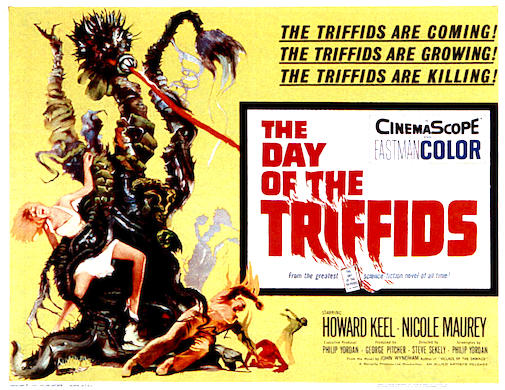We conclude (probably) our Howard Keel Centennial celebration with one of the actors last pictures before retirement (though he returned in the 1980s via "Dallas" stardom). Here's Deborah Lipp...

When Nathaniel announced a celebration of Howard Keel’s centennial, I had my pick of Keel movies. Perhaps counter-intuitively, I lept at the chance to write about my beloved The Day of the Triffids (1963). Once committed, I had a moment of fear. Here is a movie I have loved almost my entire life; a movie played over and over on local television in the pre-cable days of my youth. I have probably not seen Triffids since graduating from high school—what if it doesn’t hold up?
I need not have worried but if you want to argue that Triffids is a terrible movie, there is plenty of evidence...
 the very vaginal plant is watching you. And it's on the move.
the very vaginal plant is watching you. And it's on the move.
Special effects so cheap they border on non-existent, amateurish camera work, two completely disconnected plots, and such stellar dialogue as, “There’s no sense being killed by a plant.” But instead, I argue that The Day of the Triffids is a terrific movie— compelling, fun, intelligent, and gutsy.
Richard O’Brien poured love upon this movie when it was immortalized in “Science Fiction Double Feature,” the opening song from the musical The Rocky Horror Picture Show, which contains the line, “And I really got hot/when I saw Janette Scott/fight a triffid that spits poison and kills.”
Oh, and I’ll get to Howard Keel too.

If you haven’t seen it, The Day of the Triffids (currently streaming on Amazon Prime) opens with a massive meteor shower that creates a blinding light show for hours, all over the world. “Blinding” is, it turns out, literal. Everyone who watched—most of the world—wakes the next day to completely burned out optic nerves—blindness. Meanwhile, the meteor shower also brought triffids: Carnivorous plants that grow to enormous size and have the ability to walk. As the song says, they spit poison and kill.
Our hero, Bill Masen (Howard Keel), is recovering from eye surgery during the meteor shower, and cannot watch it. Other people who didn’t see it, and were thus spared, include a runaway girl who was hiding out, and some fairly terrifying prisoners.
Masen realizes something is wrong and removes his own bandages, wandering through a hospital gone mad. 28 Days Later and The Walking Dead will later closely copy this scene, which remains chilling.

 the hospital is deserted. Or is it?
the hospital is deserted. Or is it?
One of the fascinations of the film is that the end-of-the-world scenario is the epidemic of blindness—the weirdly vaginal killer plants (H.R. Giger was doubtless a fan) just make things worse. We see London and Paris in flames, and the chilling sight of a world in which blindness struck suddenly, while people were behind the wheel, or steering ships, or piloting aircraft. And then, while they’re wandering about trying to make sense of it all, a freaking plant eats them.
But the greatest strength of this movie is its dark psychological point of view. The Day of the Triffids is not afraid to go there. Very early, a character commits suicide rather than face what will become of the world. A bit later, a newly-blind man attempts to kidnap a sighted girl and enslave her as his guide. In a scene that has stayed with me in specific detail for decades, sighted prisoners come upon a household of mostly women, mostly blind. Sexual violence, both implied and not, makes the threat from humans far worse than from the alien plants.
 Escaping a very rapey party that the Triffids have just attacked
Escaping a very rapey party that the Triffids have just attacked
Howard Keel is a bland presence. He lacks the bombast you might expect from his musical career. Instead, he’s more like a Dana Andrews type—heroic set to “neutral.” His function is to reassure the audience that the good guys will win. He is not the interesting part of the movie, rather he is a counterweight to the interesting part.
In a parallel plot, a scientist (Kieron Moore) and his wife-assistant (Janette Scott) are stranded at a lighthouse off of Cornwall, fighting triffids and each other. Their marriage is falling apart as his alcoholism gets worse, but the horrific enemy gives them a shared purpose. The disconnected plots have long fascinated me, and I only just learned that the lighthouse stuff was filmed after the movie proper wrapped and was found to be too short. The lighthouse plot is absolutely great, but, although they defeat the triffids, we never do find out how they escape their island now that there’s no one to captain their regular supply boat.
Forget the bad special effects and enjoy the intelligence behind The Day of the Triffids.

ANNIE GET YOUR GUN
CALAMITY JANE
SEVEN BRIDES FOR SEVEN BROTHERS